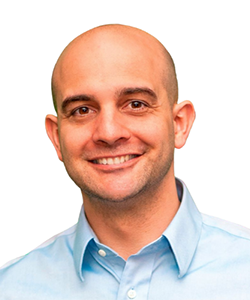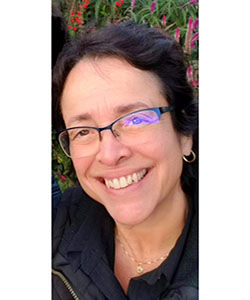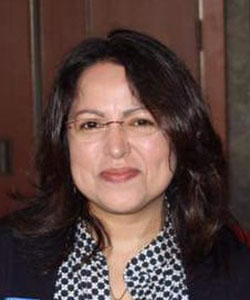
2021 Board of Directors
The candidates for the Board of Directors are listed below. Click the links under their name to read the candidate’s statement and brief biography.
The terms of current Treasurer Hilda Zavala and Director Hebba Abulsaad will expire on May 15, 2021. Hilda Zavala will be seeking reelection.
Introducing the Candidates
The NAJIT Board of Directors and the Nominations Committee, are proud to announce the candidates running to fill the two open director positions on the Board.
Our Board of Directors is responsible for setting policy and supervising the Association’s affairs, as well as laying out the path for NAJIT to follow today and in the future in representation of our interests.
To this end, the Nominations Committee always seeks to provide a slate of candidates who are active and experienced volunteers, and represent the interests, needs and profiles of NAJIT’s membership.
In order to know more about the candidates and be able to make an informed decision, read about their experience working in professional associations in their statements and bios. As in previous years, you may also send your questions to the candidates, which they will answer in the ASK THE CANDIDATE section of this page.
We remind you that voting now takes place electronically, NOT during the Annual Meeting. All Active and Life Members can vote online using the link they will receive via email or by mailing in a ballot. This year, the deadline for voting is May 14th, 2021 at 11:59 PM ET. After this date, votes will be tallied and the results announced during the Annual Meeting on May 15th, 2021.
This is your opportunity to shape the future of NAJIT. Make sure your voice is heard. Your vote and participation matter!
Ask the Candidates
Here is your opportunity to pose questions to the candidates. Click the question mark on the right to email your question. Your question will be received by the Nominations Committee and forwarded to ALL candidates, giving everyone an opportunity to respond. Responses will be posted below in the order they are received.



To cast your vote you will need the voter key and voter id that was emailed to you. If you have that information you can vote here.
Electronic Voting Process
- NAJIT conducts elections electronically through a third-party election platform (Election Runner) prior to the Annual Meeting.
- When a voting member submits an electronic ballot, a ballot receipt will appear on screen. Save or print it as Election Runner does not send an email confirmation.
- Election Runner tallies all votes within its platform. Votes are recorded by voter key. Election results are not available until the election closes. Election records are archived within Election Runner.
- On the morning of the Annual Meeting, a report of the final tally is pulled from Election Runner and provided to a designee of the Board of Directors or Elections Committee who will announce the election results.
- A paper ballot is available via the member portal or can be requested by emailing elections@najit.org. In the event ballots are mailed and received at NAJIT headquarters in advance of the Annual Meeting, those mail-in will be included and documented in the counting of the votes by the Election Committee and reported to the Membership at the Annual Meeting.
Ask the Candidates: Candidate Responses
Question #1: Please describe specific skills and qualities you are bringing to make you a successful Director?
Maribel Pintado-Espiet: What’s in my toolkit? Enthusiasm. That is what brings me here. As a freelance interpreter, trainer, and former manager I have acquired skills that would help me further the work of our association. My skillset includes good communication, adaptability, empathy, ability to initiate/delegate, critical thinking, problem solving, planning and organizing, a down to earth outlook, and accountability. I am sure there are other things as well. What matters to me is being able to bring a vision. A notion of what it takes to help our 1,400 plus members continue to have their best career ever! As a board member I will seek the input and opinions of the membership. I would ensure that there is a clear dynamic between the Board and its committees. The word transparency may seem trite but as a member, it is what I expect from my anyone, but specially from my professional association. Our being part of NAJIT has to go beyond write-offs and CEUs! Our association must pursue our goals and objectives—short and long term ones. But it also must educate us and help us envision those goals. I have been a translator and interpreter all of my professional life. At this stage I would like to share and work with others in ensuring that NAJIT is ready for the challenging times ahead. Thank you for reading my response.
Hilda Zavala-Shymanik: I believe my ability to work with different individuals as part of a team is one of the qualities that has allowed me to be a successful director in the past and one that will serve me and the association well going forward. I am a person who is passionate about her ideas but is also willing to listen to differing opinions and points of view with an open mind and who can acknowledge the value of different perspectives when deliberating. This is a vital component of an effective and cohesive board. I can accept a majority vote when I am in the minority without bitterness or personal discomfort. I am confident enough to present my views honestly and openly to receive feedback from my colleagues. It is this ability to be a unifying element promoting cohesion and consensus that makes me an efficient and effective leader.
NAJIT’s membership is diverse. There is language diversity and professional diversity as there are members who are Federally certified interpreters, those just learning about the professions and everything in between including certified translators, medical and conference interpreters as well as many state certified interpreters. As a state certified interpreter, I believe I represent a large group of NAJIT members. As a result, I can provide a different and important perspective and speak to needs that are not necessarily the same for other credentialed colleagues.
I have dedicated 30 to 40 hours a month on average to the work of the association in my current role as Interim Director and I am committed to continue to do so. I have strong organizational skills and the ability to prioritize tasks which has allowed me to stay current through reading and addressing the hundreds of e-mails directors receive as well as responding promptly when needed. I am completely engaged in the work of the board through my full participation. That participation includes contributing to debate and dialogue on pertinent issues or initiatives, following up on behalf of the board when necessary, and helping to meet deadlines while fully supporting my fellow directors.
A board must be cohesive and supportive if it is to be effective and I am proud of the role that I have played on four distinct NAJIT boards. I also draw on my experience as past President of the New York Circle of Translators, an ATA sub-chapter located in New York, to guide me in my work. I am confident that if given the honor to serve through your vote, I will continue to do so successfully with the highest level of commitment and resolve to help guide the association to new and greater heights.
Javier Castillo: For the majority of my life I have served on boards and in leadership positions and know how to work as as part of team to listen and act on the requests and needs of members.
My years working in the field have given me a good foundation to understand what our members experience day-to-day and what current and future needs are and may be.
I am resourceful and able to think quickly on my feet to resolve problems and more importantly, I am not afraid to ask for help or advice from those who have the knowledge, experience and/or resources that are needed to move a project forward.
These are the qualities that I know will help me to be able to have success as a Director.
I have extensive experience as a working interpreter/translator/consultant in the legal field and have direct knowledge of the challenges that interpreters face. I am goal-oriented, flexible and am able to work well with diverse groups. What matters to me is helping interpreters/translators and promoting the profession
Question #2: What is your vision for NAJIT as an association? What do you see as the most important challenges and opportunities facing our association?
Javier Castillo: I don’t have a vision that is different for NAJIT’s own stated vision. The most important challenges that we have are making sure that we are living up to the promises that we make to our membership and that we are consistently seen as the go-to resource for anyone working with language issues and the courts.
This includes, of course, to continue being responsive and adaptive to the “new normal”, with the expansion of remote interpreting services due to COVID and being able to provide guidance both for interpreters and members of the Judiciary and public who use our services as well as being ready to respond to the next major challenges that our profession will face.
Hilda Zavala-Shymanik: To maintain the national recognition NAJIT has achieved during its 42 years as a professional association, we need to participate at every level of policymaking related to our interpreting and translating professions. We need to be a primary resource for law enforcement agencies, court systems, and other entities that require T&I services. To accomplish this goal, our association needs to proactively reach out to Administrative Offices of the Courts and Law Enforcement Agencies to provide information to decision makers and training for judges, attorneys, courthouse personnel, and community groups.
In addition, it is NAJIT’s role to inform participants in the judiciary process and the public in general of best practices in the T&I profession. Through its many publications and committees, NAJIT has been able to send that consistent message. The more colleagues are aware of all the materials available from NAJIT and other professional sources, the easier it will be for us to educate and inform interested parties. A second prong for this effort will be to utilize the Conference Committee and the Training and Education Committee (NAJIT Academy) to provide the education and professionalization that T&I practitioners need. This will help elevate both professions to a higher level to earn the recognition and compensation deserved. Furthermore, through NAJIT’s efforts and collaborations we can find ways to influence legislation to address issues pertaining to our professions.
My vision for NAJIT also includes expanding our membership across the country. This will help disseminate our message more broadly and keep our association visible, relevant, and financially sound. Increased membership can be achieved through a variety of creative marketing, networking, and outreach programs, many of which are already in place and have proven successful in growing our association.
Finally, emerging technologies are changing our profession – particularly since the onset of COVID-19. NAJIT needs to be at the forefront of identifying best-in-class technology tools, providing training to our members, and advocating for the appropriate utilization of technology in diverse settings. Far from being a threat to interpreters and translators, technology represents a tremendous opportunity to enhance our profession, to improve communication and, to make us more relevant. If elected to the Board, I will propose that we establish a new Technology and Innovation Ad Hoc Committee to help ensure that NAJIT is in a leadership position regarding the role of technology in our profession.
Question #3: Do you see a particular area or issue in interpreting or translation that NAJIT should address in a future position paper? If so, please explain.
Maribel Pintado-Espiet: I believe NAJIT must address the issue of artificial intelligence in language translation and interpretation. As we have all experienced during the Pandemic, many providers have turned to automated solutions or even gone without using interpreters because of what is perceived as an “insurmountable” technical issue. We must identify the benefits and risks of using automated language solutions specially as they are marketed as ‘cost-saving’ measures. As language service providers we must guide and educate the community. The scope of our position paper should include the use of remote video platforms and its impact on meaningful communication. I would hope to partner with our own educational and research scholars at SSTI for guidance and support. I would also hope to review existing position papers for possible updating.
Thank you.
Javier Castillo: I currently do not have any ideas top-of-mind that would merit a new position paper. But, the landscape is always evolving and there are always new issues.
NAJIT’s position papers have been instrumental in helping our members and others understand our roles, our practice, our limitations and expectations in the legal field.
As a Board Member, I would work on keeping an eye out for potential issues that we face or that members bring to my attention that could be addressed in a new or an updated position paper.
Hilda Zavala-Shymanik: This is my favorite question in the last two years!!
I understand the importance of position papers and I acknowledge their power. However, I believe that it is crucial to do more than create position papers. At this point we need to find a way to get all position papers to court administrators, decision makers, and anyone in charge of AOC’s Bench and Bar training programs. In my opinion, one of the most important positions papers NAJIT has produced is the “Team Interpretation in Court-Related Proceedings” of May 2020 and yet we all know that even the most advanced and progressive judiciaries in the country are not fully aware of the reasons why team interpreting is so important – nor do they understand the impact that a single interpreter working alone during a long process can have on the accuracy of interpretation in a hearing or trial.
I think that before a new position paper is issued, we need to launch a campaign to reach out to all the parties previously mentioned to make them aware of the existing ones. This project may soon find a home at NAJIT and it is dear to my heart.
Immediately next in line, within the next few months, a Virtual Interpreting Best Practices Position Paper is in order. The last document about remote interpreters is about telephone interpreting and it was created in 2009. We need to work on this as soon as possible!
Question #4: Have you advocated on behalf of interpreters and translators, either as an individual or as part of a larger group or association? What specifically did you do, and what results did your actions have?
Maribel Pintado-Espiet: I have been in the trenches advocating for court interpreters and translators, indeed. When the State of Massachusetts enacted the law requiring the training and certification of interpreters back in 1986, I had the good fortune of directing that effort for the courts. As the second state to request certification for the courts (first one being, of course, California), I definitely had my work cut out for me. The process for establishing training, certification, compensation, and ethical standards was a challenge as it had to balance the court needs and the interpreter needs. In addition, Massachusetts was at the time and continues to be, the only state charged with the certification and assignment of interpreters across the state. There was no magic in raising the hourly wage from $15.00 to $40.00 or creating full time positions that started at $55k plus instead of $17k per year. I held public hearings, had tons of meetings, and visited each and every court in all 14 counties (each one has at least 11 courts) and all 7 divisions. My biggest challenge was walking that thin line between being an administrator and being an interpreter. I had an advisory committee that did not always agree with me, freelance interpreters who demanded better pay and working conditions, judges who resisted the whole idea of professional interpreters, and a big language community representing no less than 14 very strong languages.
By 1993 I had established a written and oral certification exam for 7 languages. I had also created a 150 hr. training program which was offered free of charge in our office. Our work was recognized by the National Center for State Courts and I was part of the process that led to the National Consortium Exam.
All of those things are in the past now but the lessons I learned during those years are still very much alive today. Communicating and building coalitions with my peers. Educating providers. Educating stakeholders in the community. Providing language access in an equitable and efficient manner. To this day I am indebted to colleagues like Janice Palma and Robert Joe Lee, among others, for their selfless dedication to our profession. I also have the many freelancers who shared their frustrations, their challenges, and their fears because, ultimately, it’s the people in the trenches who will continue to drive the process.
Javier Castillo: I can’t recall a particular instance that stands out.
However, ever since I began working in this field I’ve always worked to try and elevate the status of our profession and train others about the roles and responsibilities of language professionals in the judiciary.
I am constantly working with clerks, attorneys and judges and trying to help shape their ideas of what a language professional can or cannot do.
When the pandemic broke out and many courts were learning to work with Zoom and other platforms, I was asked to come in and give guidance on best practices to some of the clerks and also to help work with some interpreters who were new to remote interpreting to get them ready for upcoming hearings.
Additionally, I have designed and taught courses for law students, attorneys and judges to enable them to view what we do as a profession and to help pave the way for future encounters and to answer questions about ethics and protocols.
Over the years, I have been invited to speak at attorney and judges conferences to talk about court interpreting issues and make sure that everyone understands best practices.
In my work in training interpreters and translators I always stress professionalism and ethics, making sure that everyone understands the importance of our roles and above all continued improvement, as we know that we are working in a continuously changing landscape.
When asked to serve on the board of CATI and then later asked to run as President, I did so to offer my experience to help advocate for interpreters and translators in North and South. When asked to serve as Head of the U.S. Chapter of IAPTI, I accepted so that I could help advocate for and connect interpreters and translators in the U.S.
My career has been one of advocacy and service to our profession.
I hope to continue along that path with the other members of the NAJIT board.
Hilda Zavala- Shymanik: Yes, I have! I advocate on behalf of interpreters and translators on a daily basis by promoting workshops, training programs, college and university certificates and degrees, being part of NYU panels, Hunter College T&I presentations, recommending presenters for NY and NJ annual judiciary trainings for staff interpreters, presiding the NYCT (New York Circle of Translators – ATA Chapter) representing ATA, NAJIT and the NYCT at the UN, writing articles and blogs, through my work as a NAJIT Board member, recommending certified colleagues to agencies, attorneys, AOCs, interpreter coordinators and thus promoting the use of professional interpreters that implement best practices in their work. I’ve also been a member of the Advocacy Committee while chairing the Conference Committee and as such participated in a visit to DHS for an open house in 2017, and through other local efforts.

